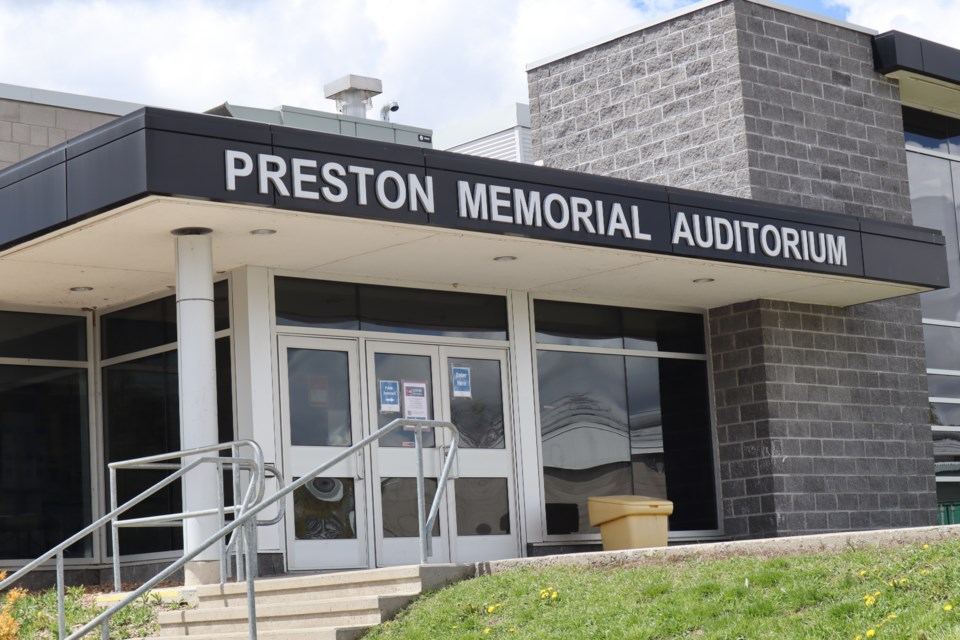The dream of seeing the Preston Memorial Auditorium transformed into a state-of-the art sports facility came true Thursday night for hundreds of local hockey players and sports fans.
Cambridge council gave the go-ahead to rebuild the arena for $26.2 million next year, including two NHL-size ice pads, additional change rooms and a completely renovated space to better accommodate the Rivulettes, Cambridge Minor Hockey and the Preston Figure Skating club.
“This is very exciting to our community,” said Coun. Mike Mann, congratulating everyone who stepped forward to voice their opinions on the project he believes will be a showcase for the community and demonstrate the city’s commitment to sports tourism.
“Everyone has stepped up to the plate or put their stick on the ice so to speak.”
“We are going to build a world-class modern facility,” added Coun. Donna Reid. “Thanks to everyone in the community who urged us to take this stand and build this facility.”
The decision means Cambridge taxpayers will shoulder an additional 1.21 per cent tax increase in 2022, bumping next year’s tax hike to 4.24 per cent to raise $100.6 million for the city’s $133.4 million operating budget.
The property tax increase equates to $60.53 for homes assessed at the average value of $333,200.
Add on the new city water rate of $29 and the average homeowner will pay $89.53 more on the city’s portion of the tax bill next year.
The city also approved next year’s capital budget at $59.1 million, which accounts for an earlier decision to put the Riverside Dam project on hold.
Funding the arena expansion by taking on debt means city taxpayers will be on the hook to pay down the annual principal and interest to the tune of $1.5 million, or $17.24 per household.
But concern about the increase didn’t worry councillors as much as letting down a community of user groups desperate to see the city upgrade its “substandard” sports facilities.
“I thought long and hard about this decision and what was best for the city,” said Reid in tabling her motion to go with the most expensive option for the arena.
“We’re not building it necessarily for today. We’re building it for the future. We know Cambridge is going to continue to grow and we need these facilities now,” she said.
Staff had recommended capping the construction budget at $13.2 million, which would have limited the project to a single ice pad with plans to add a second one in the future.
But user groups balked at the idea.
John Morton, from the Cambridge Minor Hockey Association, told council Cambridge has fallen behind most other cities and towns in the region in terms of replacing its facilities and said any decision to delay the expansion has the potential to damage participation in sports.
Head coach of the Rivulettes Women’s Junior Hockey team Geoff Haddaway said any other decision would have totally ignored the growth that’s happening in female athletics.
The planned expansion, which creates a 77,500 square foot facility complete with dedicated change rooms for the Rivulettes women’s team and more spectator space with better sight lines, will also have an economic impact on the community, Haddaway said. Charity events for the team now average over 300 spectators.
Reid said a goal of gender parity was one of the driving factors behind her decision to recommend the full expansion.
“We know Cambridge is going to continue to grow and we need these facilities now,” she said.
“The cost is not going to become less if we leave it for another day, or another decade.”
Coun. Mike Devine said it wasn’t a difficult decision for him.
“If we’re talking about gender, this is what the community needs,” he said. “It’s not going to be cheap, but on the same token, going down the road it’s not going to get any cheaper."
“For decades we’ve had insufficient arenas,” added Coun. Shannon Adshade. “We have one chance to get this right, let’s do it now to prevent future increases. Let’s be known as the city that supports its recreational facilities rather than neglect them.”
Coun. Pam Wolf agreed. “We saw how clearly delaying building of the sports complex added to the price. Too many of our citizens have told us they were embarrassed by our outdated arenas and it’s time to correct that.”
Coun. Scott Hamilton said he’s heard concern from many constituents about the need for promised new rinks and called it “a generational investment” that’s “going to be around for a long time.”
“Cambridge is a hockey town with a rich sports history,” he said. “This benefits the town as a whole. It’s a point of pride for the city. This moves us in the right direction in recognizing that.”
Sponsorship opportunities could help lessen the final cost of the project. Revenue from naming rights for the auditorium is estimated at about $2 million.
Coun. Nicholas Ermetta suggested a restaurant with a river view could be added to the design to provide further leasing revenue for the city.
While supportive of the arena project on its own, Ermetta wasn’t comfortable with the tax increase needed to pay for it and wanted the operating budget deferred to give staff a chance to rework some of the numbers to find savings. But his motion to defer couldn’t find a seconder.



